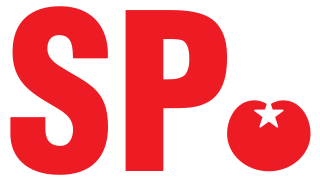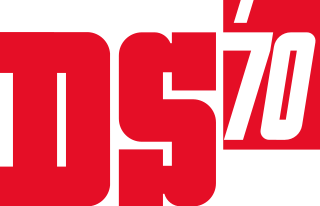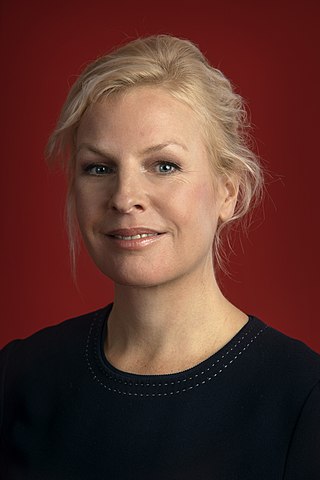The Labour Party is a social democratic political party in the Netherlands.

The Christian Democratic Appeal is a Christian democratic and conservative political party in the Netherlands.
GroenLinks is a green political party in the Netherlands.

Democrats 66 is a social liberal and progressive political party in the Netherlands, which is positioned in the centre of the political spectrum. It is a member of the Liberal International (LI) and the Alliance of Liberals and Democrats for Europe (ALDE).

Wouter Jacob Bos is a retired Dutch politician of the Labour Party (PvdA) and businessman.

The Socialist Party is a democratic socialist and social democratic political party in the Netherlands. Founded in 1971 as the Communist Party of the Netherlands/Marxist–Leninist, the party has since moderated itself from Marxism–Leninism and Maoism towards democratic socialism and social democracy.

The Catholic People's Party was a Catholic Christian democratic political party in the Netherlands. The party was founded in 1945 as a continuation of the interwar Roman Catholic State Party, which was in turn a successor of the General League of Roman Catholic Caucuses. The party was in government throughout its existence. In 1977, a federation of parties including the Catholic People's Party, the Anti-Revolutionary Party (ARP) and the Christian Historical Union (CHU) ran together under the Christian Democratic Appeal (CDA) banner. The three participating parties formally dissolved to form the CDA in 1980.

Young European Socialists (YES), formerly the European Community Organisation of Socialist Youth (ECOSY), is an association of social democratic youth organisations in Europe and the European Union.

The Pacifist Socialist Party was a democratic socialist Dutch political party. It is one of the predecessors of GroenLinks.

Adrianus Petrus Wilhelmus "Ad" Melkert is a Dutch politician and diplomat of the Labour Party (PvdA) who has served as a Member of the Council of State since 20 January 2016.

The Communist Party of the Netherlands was a communist party in the Netherlands. The party was founded in 1909 as the Social Democratic Party (SDP) and merged with the Pacifist Socialist Party, the Political Party of Radicals and the Evangelical People's Party in 1991, forming the GroenLinks. Members opposed to the merger founded the New Communist Party of the Netherlands.

The Political Party of Radicals was a Christian-radical and green political party in the Netherlands. The PPR played a relatively small role in Dutch politics and merged with other left-wing parties to form GroenLinks in 1991.

The first Kok cabinet, also called the first Purple cabinet was the executive branch of the Dutch government from 22 August 1994 until 3 August 1998. The cabinet was formed by the social-democratic Labour Party (PvdA), the conservative-liberal People's Party for Freedom and Democracy (VVD), and the social-liberal Democrats 66 after the election of 1994. The cabinet was a centrist grand coalition and had a substantial majority in the House of Representatives with Labour Leader Wim Kok serving as Prime Minister. Prominent Liberal politician Hans Dijkstal served as Deputy Prime Minister and Minister of the Interior, while Progressive-Liberal Leader Hans van Mierlo served as Deputy Prime Minister and Minister of Foreign Affairs.

The Third Lubbers cabinet, also called the Lubbers–Kok cabinet, was the executive branch of the Dutch government from 7 November 1989 to 22 August 1994. The cabinet was formed the christian-democratic Christian Democratic Appeal (CDA) and the social-democratic Labour Party (PvdA) after the election of 1989. The cabinet was a centrist grand coalition and had a substantial majority in the House of Representatives with Christian-Democratic Leader Ruud Lubbers serving as Prime Minister. Labour Leader Wim Kok served as Deputy Prime Minister and Minister of Finance.

The second Van Agt cabinet was the executive branch of the Dutch Government from 11 September 1981 until 29 May 1982. The cabinet was formed by the christian-democratic Christian Democratic Appeal (CDA), the social-democratic Labour Party (PvdA) and the social-liberal Democrats 66 (D'66) after the election of 1981. The cabinet was a Centre-left grand coalition and had a substantial majority in the House of Representatives with Christian-Democratic Leader Dries van Agt serving as Prime Minister. Former Labour Prime Minister Joop den Uyl the Labour Leader served as Deputy Prime Minister, Minister of Social Affairs and Employment and was given the portfolio of Netherlands Antilles Affairs, Progressive-Liberal Leader Jan Terlouw served as Deputy Prime Minister and Minister of Economic Affairs.

The Democratic Socialists '70 was a social democratic political party in the Netherlands.
This article gives an overview of socialism in the Netherlands, including communism and social democracy. It is limited to communist, socialist, social democratic, and democratic socialist parties with substantial support, mainly proved by having had a representation in parliament. The sign ⇒ means a reference to another party in that scheme.

Mei Li Vos is a Dutch politician, former trade unionist and editorialist. A member of the Labour Party (PvdA), she was a member of the House of Representatives from 1 March 2007 to 17 June 2010 and again from 20 September 2012 until 23 March 2017. She has been a member of the Senate since 11 June 2019, serving as parliamentary leader of the PvdA group until 2023, and First Vice-President of the Senate since then.

Attje Harma Kuiken is a Dutch politician and former civil servant serving as the leader of the Labour Party in the House of Representatives since 22 April 2022. She has been a parliamentarian since 30 November 2006 with a brief interruption in 2010. She served two terms as parliamentary leader of the Labour Party, and was leader of the Labour Party between June and August of 2023.

Michiel Frans van Hulten is an analyst, writer, teacher and consultant. He is a former director of Transparency International EU and a former Dutch politician. He was a Member of the European Parliament (1999–2004) and was chairman of the Labour Party from December 2005 until April 2007.

















